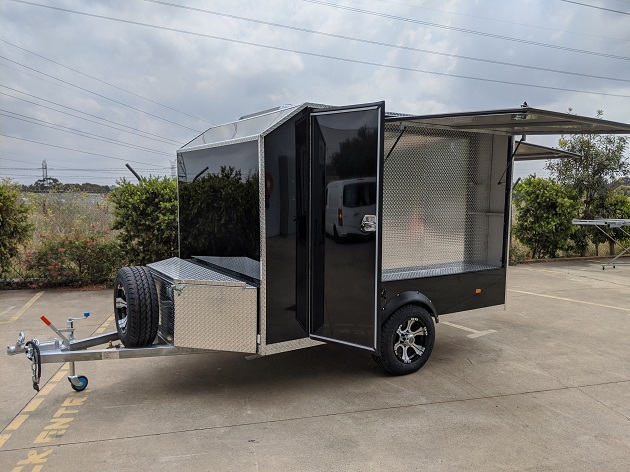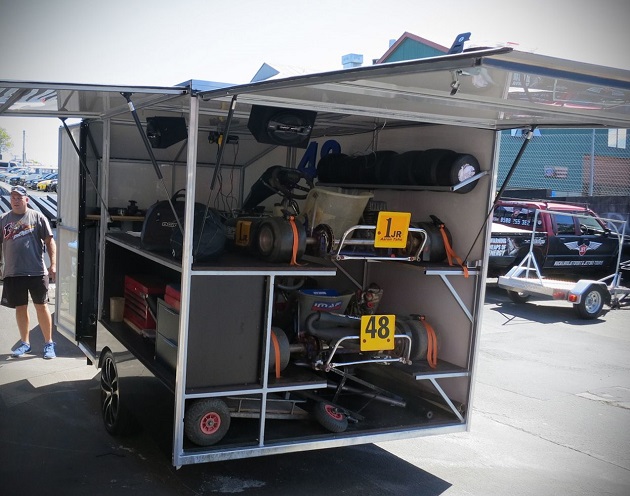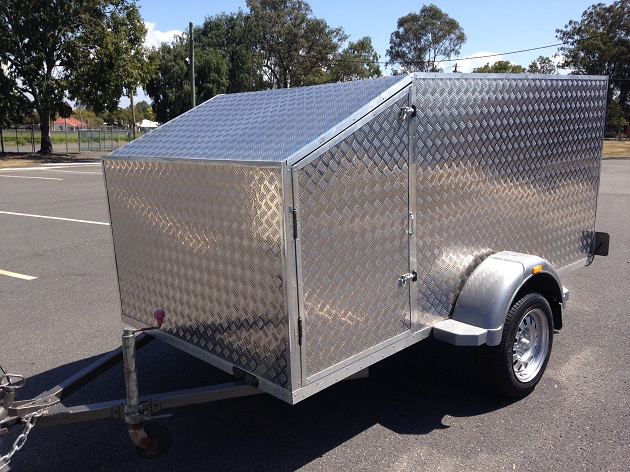Discover the Right Enclosed Trailer for Storage & Transportation
When it comes to transporting equipment and goods, sometimes utes and ute tray equipment can’t do the job. Hence, the need for enclosed trailers.

Many factors are at play when you set out to buy a closed box trailer. The market is saturated with models and their vague short descriptions don’t help you either. So, if you are wondering what features to consider to ensure you get the right enclosed utility trailer, you might find the following buyer’s guide useful.
Materials
The service life of the trailer depends on the materials put into making it. It’s weight also. Chief contenders here are aluminium and steel. Aluminium will decrease the overall weight of the trailer and does not rust. You need to make sure to do some maintenance from time to time (checking for cracks) and keep them clean.
Steel is a cheaper option, but it can add up some weight which can make towing it somewhat more difficult. If left unchecked, steel can rust and crack. On the other hand, you can pick a trailer made of galvanised steel (also known as no maintenance steel) which is superior to plain steel. Combined with a good quality baseline (like a checkered plate), it can serve you for a long time to come.
Usually, the most durable and lightweight enclosed trailers on the market are a combination of an aluminium body and a galvanised steel chassis and frame. This way, you can get the best of both worlds..

Size
It is very likely that you already have the measurements of your ideal closed in utility trailer. It is a good place to start, but don’t expect that you will always find exactly what you ask for. Go for a manufacturer that offers several options for standardised size customisation of enclosed trailers, like 8 x 5, 9 x 5, 10 x 5, 10 x 6 and 12 x 6 sizes (in meters).
When it comes to height, usually you can find either 1450 mm and 2000 mm versions. Just keep in mind that adding a square meter area to the inside has to be within the total carrying capacity of the trailer under load.
Construction Quality
Look for a trailer maker that uses high-quality fittings because this will translate into a longer lifespan and fewer defects. This applies to heavy-duty stainless steel hinges, gas struts and flush mount locks. It also extends to sealed lift doors or windows.
Buying an enclosed trailer that wasn’t crafted with much care will quickly make you search for the best industrial sealant to make it watertight. Go for retailers that can assure you that they are on top of their fabricating and sealing process. No one wants a leaking roof, not even in their utility trailer.
Outer Skin
There is a great deal of concern among prospective boxed trailer owners about the optimal outer skin width. The questions go along the lines of: Does the thickness of the outer skin matter? It depends. If you are looking for a cheap trailer that will be put to use occasionally – do get a trailer with a thin case.
If your trailer comes attached to your workhorse and you intend to use it along with your everyday business, then go for a thicker outer skin. Thick skin is more durable and resists warping when exposed to extremes in temperature.
Shape
Some people prefer rounded roofs which doesn’t make much sense for small enclosed utility trailer. The round roof adds slight headroom space but it doesn’t affect towing gas economy by a lot. Speaking of which a lot of owners seem to argue over the efficiency of v-nose compared to flat nose trailers. The v-nose might be marginally more efficient, but not to a degree that should dictate your choice.

Colours
Sometimes appearance is important if you represent a business or a franchise. You should be mindful that not all of your colour wishes can be accommodated. You might be forced to select one of those that are available. Usually, these are basic colours like white, red, black, blue, green and silver. Some offer even more (up to 12) but this depends on the material for the trailer that you have already chosen in the first place.
Also, consider the things that you will be transporting. White and light colours generally handle heat better than black and dark colours. If you’ll be transporting goods that should stay cool, then light-coloured options are definitely more suitable.
Inside Compartments
The standard trailer is a simple enclosed box. While this is not your home or your tiny home and long term storage area is limited, that doesn’t mean you shouldn’t put some thought into it. If you have a specific business need (like adding a freezer or adding an extra hinge here and there) and your trailer maker is not up for customisation, you will have to do this on your own. Or look for another professional.
Security and Locks
You have to be sure that your goods are secured. Go for a trailer that has good doors and sturdy impenetrable finish. This, combined with impact-resistant walls (to a reasonable degree) will not only keep your loads safe but will also extend the utility life of your trailer.